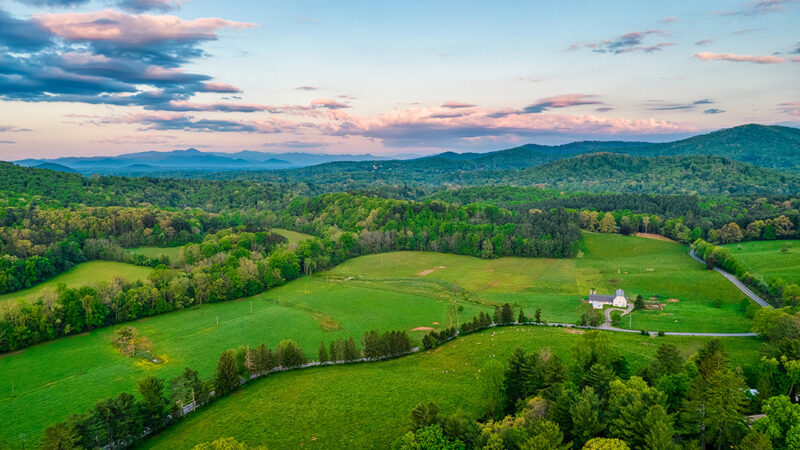
The Warren Wilson College Board of Trustees has unanimously voted to pursue a partnership with the Southern Appalachian Highlands Conservancy (SAHC) to establish four conservation easements on 600 acres of the college’s land.
The decision will go to the Board of the Southern Appalachian Highlands Conservancy for approval this summer. The process will require up to four years to complete, contingent upon securing adequate grants and funding.
Once approved and funded, the 600-acre tract of farm and forest land in the Swannanoa Valley would be preserved in perpetuity.
“The conservation impact of protecting these 600 acres — in the largest remaining privately-held tract of farm and forestland in Buncombe County — will be astounding,” said Jess Laggis, the Southern Appalachian Highlands Conservancy Farmland Protection Director. “This project is highly ranked for conservation value both as undeveloped mountain land and important agricultural land.”
The Southern Appalachian Highlands Conservancy follows a rigorous process in evaluating the conservation values of any potential project. For example, they look at measurable acres of important soils, water quality characteristics and linear feet of stream, habitat types and connectivity.
“Beyond the tangible ecosystem services provided by the land, the ripples of positive impact will be echoed in the minds and hearts of people who cherish these rolling fields and forests,” Laggis said, noting that she grew up on Warren Wilson’s campus. “So many people at Southern Appalachian Highlands Conservancy and at Warren Wilson have dreamed this shared dream for so long and have worked so diligently to lay the foundation for this moment. This is a monumental project, and we deeply appreciate all of the efforts to move forward in permanent protection of these 600 acres.”
Warren Wilson’s decision to pursue conservation of the land underscores the college’s commitment to sustainability, environmental protection and climate solutions.
“This is a historic moment for Warren Wilson College and for the conservation of land in Western North Carolina,” said Warren Wilson College President Dr. Damián J. Fernández. “This decision reinforces our environmental leadership at a critical time of climate change and shows our commitment to advance the College’s legacy in the Swannanoa Valley and beyond.”
Warren Wilson College has long been known as a leader for sustainable land management, land stewardship and environmental innovation. The land serves as a working, learning and living laboratory for its students. Through the Center for Working Lands, the college’s land functions as a landscape for investigating and demonstrating land management practices that integrate ecological services with economic and social returns.
“Our students learn approaches to mitigating the effects of climate change and managing an integrated landscape, and they do it with hands-on action,” said Dr. David Ellum, dean of the Center for Working Lands. “Do you know other undergraduate students who have performed c-sections on sheep, grown and distributed economically important forest plants as a land conservation tool, measured the carbon sequestration benefits of cattle grazing, electrified an 80-year old tractor or conducted ecological management practices on a working forest?”
In addition, the land is also essential to Warren Wilson’s new Master of Science in Applied Climate Studies, which will begin in fall of 2025. The low-residency program will focus on applied climate solutions that incorporate climate mitigation, adaptation and resilience, social justice, economics and ecology.
The decision to pursue the land conservation easement is perhaps most significant because of the ways it would preserve the rich biodiversity of the region. The Blue Ridge Mountains of Western North Carolina are one of the most biodiverse non-tropical regions in the world.
“Our campus is a microcosm of a vibrant community that provides unmatched opportunities for research, action and leadership,” Ellum said. “We’re not only preserving our land for generations to come, we’re preserving a place for our students to work and do research that impacts the entire region now.”
Both Warren Wilson College and the Southern Appalachian Highlands Conservancy look forward to working together to move the process forward.
“The Southern Appalachian Highlands Conservancy and Warren Wilson College have been discussing permanently conserving this property for decades. We’re thrilled that the college is giving us the opportunity to pursue this conservation easement,” said Carl Silverstein, executive director of Southern Appalachian Highlands Conservancy. “This property is treasured by so many in our community, and conserving it will resonate with people here and all over the country. Raising the federal, state, and county grants and private donor funds necessary to complete the transaction will require diligent hard work, persistence, and broad community support. But seeing this beloved property permanently protected will be well worth the effort.”